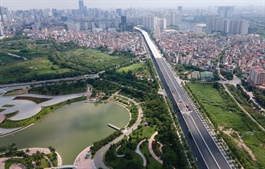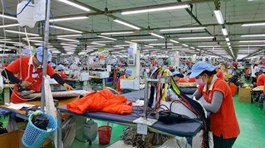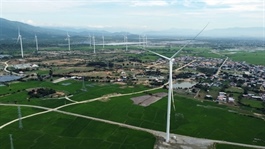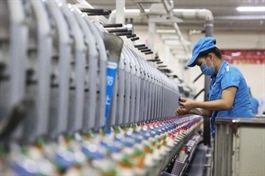Vietnam reaffirms bright outlook amidst global economic uncertainty
Vietnam reaffirms bright outlook amidst global economic uncertainty
Despite uncertainties in the global economy, Vietnam is predicted to maintain strong economic growth in the medium term as exports rebound and the country continues to gain benefits from the shift in global supply chains to Southeast Asia's manufacturing hubs.

In October, Prime Minister Pham Minh Chinh said that GDP in 2023 will reach over 5 per cent, lower than the initial target. The Asian Development Bank (ADB) adjusted its growth forecast for Vietnam from 6.5 per cent in April to 5.8 per cent.
While this adjustment reflects the impact of global economic uncertainties, it is important to note that Vietnam remains the fastest-growing country in Southeast Asia.
“The ability to sustain positive growth in a turbulent global environment underlines the resilience and potential of the Vietnamese economy,” an expert at BW Industrial Development JSC (BW) said.
Fion Ng, COO of BW speaking at the Mingtiandi Singapore Forum
According to the General Statistics Office, Vietnam’s GDP growth in the initial nine months of 2023 was recorded at 4.24 per cent, signalling a deceleration when compared to the same period in 2022. While this may raise concerns, a deeper examination of the quarterly statistics unveils an optimistic pattern. The GDP climbed by 3.28 per cent in the first quarter, 4.05 per cent in the second quarter, and 5.33 per cent in the third quarter.
Exports, which have been a crucial contributor to GDP, also saw a sharp fall last year. However, there are positive signs as on-quarter growth showed an encouraging trend, with Q2 witnessing an 8.1 per cent increase compared to Q1, and Q3 achieving a growth rate of 10.3 per cent over Q2.
The aforementioned figures show a decrease on-year, but remarkable growth is seen when comparing them on a quarterly basis.
“This suggests resilience and adaptability within Vietnam’s export sector and implies that the economy is steadily building momentum,” the BW expert stated.
BW also highlighted Vietnam's flexibility in terms of the shift in growth drivers from exports to domestic consumption and service activities. The food and beverages and accommodation services (13.17 per cent), logistics and warehouses (8.66 per cent), and wholesales and retail (8.06 per cent) business lines all displayed strong growth.
The positive signals from domestic consumption accelerated the demand for warehouses, factories, and logistics real estate like that developed by BW, which has established relationships with over 270 tenants from more than 20 countries in the e-commerce, last-mile delivery, and high-tech manufacturing sectors.
BW is a for-rent logistics and industrial real estate platform in Vietnam. It is a joint venture between Warburg Pincus, a global growth investor, ESR Cayman Ltd., the largest Asia-Pacific-focused logistics real estate platform, and Becamex IDC, a pioneer developer of large-scale industrial townships in key markets across Vietnam.
Currently, BW owns a remarkable portfolio comprising 8.5 million square metres of industrial land in prime locations across 48 projects in 11 key provinces in Vietnam, with over 3 million sq.m of gross floor area of completed or under-construction properties.
Speaking at the Mingtiandi Singapore Forum in November, Fion Ng, COO of BW said, "Supply chain diversification remains a top priority for our customers. As the largest for-rent logistics and industrial real estate platform, we experienced a significant increase of 75 per cent in leasing inquiries in 2023. We continue to see strong demand despite the softening of the export orders that we all hear about. That has led to excellent occupancy on the ground – a rate of nearly 95 per cent for our stabilised assets."
Echoing Ng's opinion, experts from Savills pointed out that 2023 witnessed the development of the industrial real estate sector. Savills observed a rise in enquiries and site visits from global manufacturing, logistics, and e-commerce companies, which is indicative of the rising demand for industrial real estate.
In 2023, there were 397 industrial parks (IPs) established nationwide with a total land area of 122,900 hectares, according to Savills. The IPs have a high occupancy rate of over 80 per cent, of which key northern provinces have reached 83 per cent and those in the South have hit 91 per cent.
To meet the increased demand of tenants, BW is on track to deliver 10 new projects totalling 1 million sq.m this year.
“This year, the star performer will be the manufacturing sector. We see that supply chain diversification will continue into the next couple of years,” Ng added.























